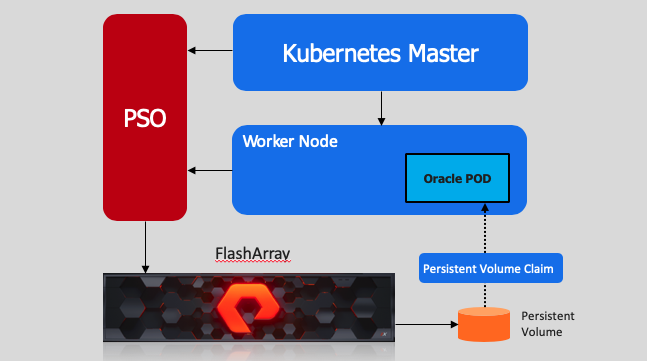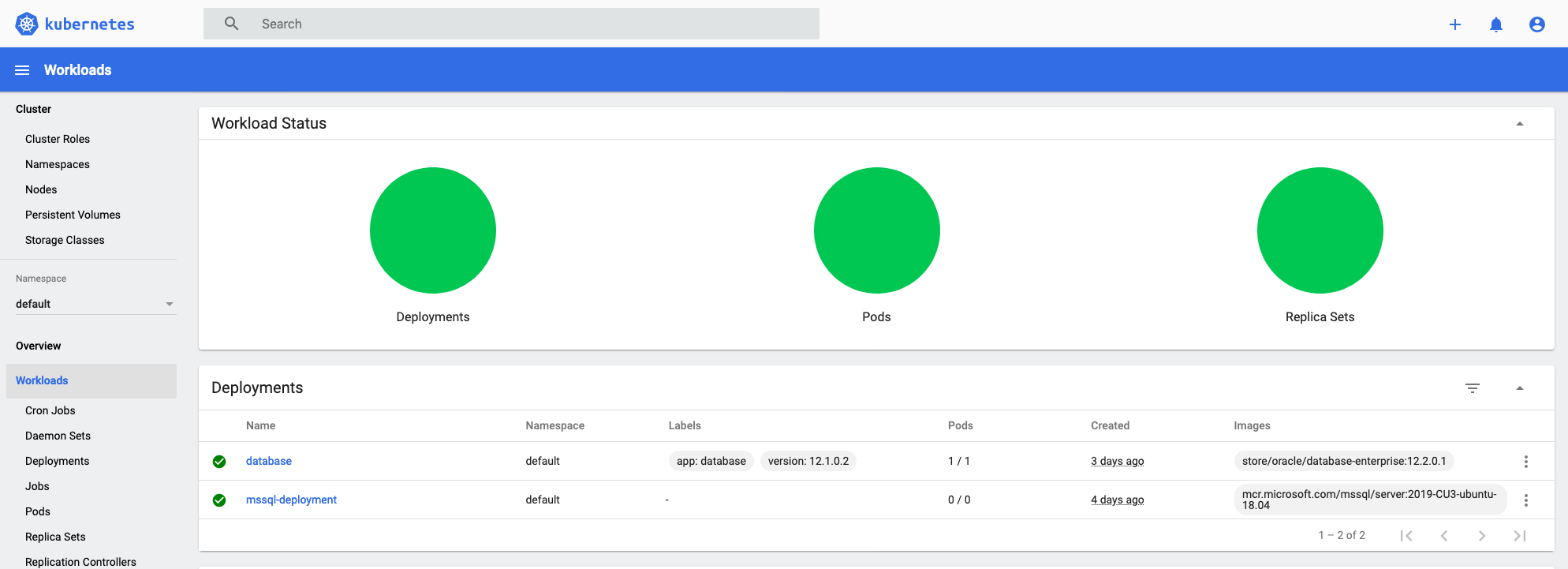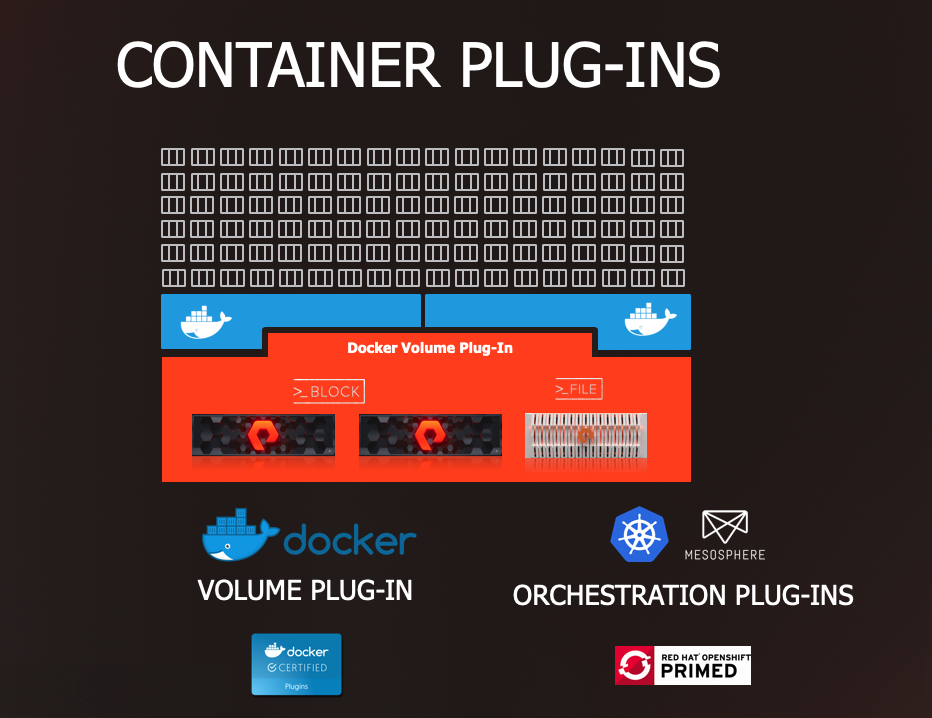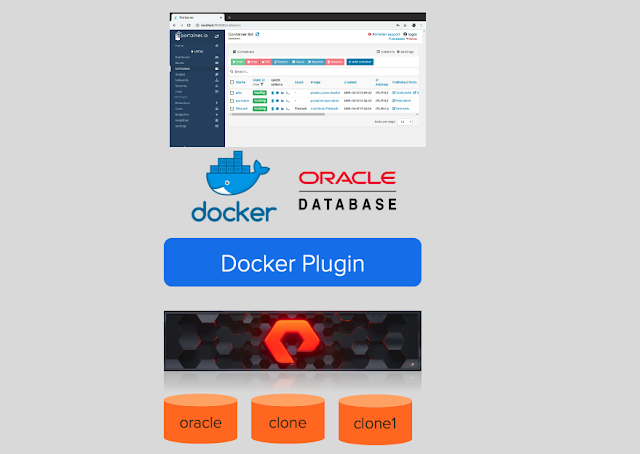Oracle Containers on Kubernetes and Pure Service Orchestrator
Pure Service Orchestrator allows for smart provisioning of storage to one or many arrays, this provides administrators and developers the ability to provision storage on demand with cloud like functionality, ease and flexibility.
In this blog I will use Pure Service Orchestrator ( PSO ) to automate the provisioning of volumes to Kubernetes which will then be used to create Oracle containers using persistent storage.
My next blog will demonstrate the power of using Pure Storage snapshots and cloning to rapidly create instant copies of the source Oracle database.
Environment
| Role | FQDN | IP | OS | RAM | CPU | K8 Ver |
|---|---|---|---|---|---|---|
| Master | master.localdomain.com | 192.168.111.231 | Ubuntu 18.04 | 5G | 3 | 1.18 |
| Worker1 | worker1.localdomain.com | 192.168.111.232 | Ubuntu 18.04 | 8G | 4 | 1.18 |
# kubectl get nodes -o wide
NAME STATUS ROLES AGE VERSION INTERNAL-IP EXTERNAL-IP OS-IMAGE KERNEL-VERSION CONTAINER-RUNTIME
master Ready master 4d4h v1.18.2 192.168.111.231 <none> Ubuntu 18.04.1 LTS 4.15.0-29-generic docker://19.3.6
worker1 Ready <none> 4d4h v1.18.2 192.168.111.232 <none> Ubuntu 18.04.1 LTS 4.15.0-99-generic docker://19.3.6
# kubectl get nodes -o wide
NAME STATUS ROLES AGE VERSION INTERNAL-IP EXTERNAL-IP OS-IMAGE KERNEL-VERSION CONTAINER-RUNTIME
master Ready master 4d4h v1.18.2 192.168.111.231 <none> Ubuntu 18.04.1 LTS 4.15.0-29-generic docker://19.3.6
worker1 Ready <none> 4d4h v1.18.2 192.168.111.232 <none> Ubuntu 18.04.1 LTS 4.15.0-99-generic docker://19.3.6Install PSO
- Install helm 3 kubernetes package manager
# curl -fsSL -o get_helm.sh https://raw.githubusercontent.com/helm/helm/master/scripts/get-helm-3
# ./get_helm.sh
- Add the Pure Storage Repo
# helm repo add pure https://purestorage.github.io/helm-charts
# helm repo update
-- look for the new pure csi driver --
# helm search repo pure-csi
NAME CHART VERSION APP VERSION DESCRIPTION
pure/pure-csi 1.2.0 1.2.0 A Helm chart for Pure Service Orchestrator CSI ...
You can see we are using PSO version 1.2 or 5.2
- Download the Pure Storage values file which is used to configure connectivity to the FlashArray or FlashBlade
wget https://raw.githubusercontent.com/purestorage/helm-charts/master/pure-csi/values.yaml
- Edit the values file with the FlashArray details
arrays:
FlashArrays:
- MgmtEndPoint: "192.168.111.130"
APIToken: "476d58bc-3c91-0d10-1b9e-0f31058c4621"
- Create the PSO namespace ( Required for Helm 3 )
# kubectl create namespace pso
namespace/pso created
- Now we install PSO using the values file we created
# helm install pso-csi pure/pure-csi -f values.yaml --namespace pso
NAME: pso-csi
LAST DEPLOYEd: Fri 8 May 22:14:50 AEST 2020
NAMESPACE: pso
STATUS: deployed
REVISION: 1
TEST SUITE: none
- Confirm the new Pure Storage classes have been configured
# kubectl get sc
NAME PROVISIONER RECLAIMPOLICY VOLUMEBINDINGMODE ALLOWVOLUMEEXPANSION AGE
pure pure-csi Delete Immediate true 4d4h
pure-block pure-csi Delete Immediate true 4d4h
pure-file pure-csi Delete Immediate true 4d4h
"the pure driver will be deprecated, so use the pure-block driver"
- Check for all the service are running in the PSO namespace
# kubectl get all -n pso
NAME READY STATUS RESTARTS AGE
pod/pure-csi-864dm 3/3 Running 0 3d6h
pod/pure-provisioner-0 4/4 Running 0 3d6h
NAME TYPE CLUSTER-IP EXTERNAL-IP PORT(S) AGE
service/pro-csi-pure-csi ClusterIP 10.96.217.49 <none> 12345/TCP 4d4h
service/pure-provisioner ClusterIP 10.96.125.41 <none> 12345/TCP 4d4h
NAME DESIRED CURRENT READY UP-TO-DATE AVAILABLE NODE SELECTOR AGE
daemonset.apps/pure-csi 1 1 1 1 1 <none> 4d4h
NAME READY AGE
statefulset.apps/pure-provisioner 1/1 4d4h
# curl -fsSL -o get_helm.sh https://raw.githubusercontent.com/helm/helm/master/scripts/get-helm-3
# ./get_helm.sh
# helm repo add pure https://purestorage.github.io/helm-charts
# helm repo update
-- look for the new pure csi driver --
# helm search repo pure-csi
NAME CHART VERSION APP VERSION DESCRIPTION
pure/pure-csi 1.2.0 1.2.0 A Helm chart for Pure Service Orchestrator CSI ...
You can see we are using PSO version 1.2 or 5.2
wget https://raw.githubusercontent.com/purestorage/helm-charts/master/pure-csi/values.yaml
arrays:
FlashArrays:
- MgmtEndPoint: "192.168.111.130"
APIToken: "476d58bc-3c91-0d10-1b9e-0f31058c4621"
# kubectl create namespace pso
namespace/pso created
# helm install pso-csi pure/pure-csi -f values.yaml --namespace pso
NAME: pso-csi
LAST DEPLOYEd: Fri 8 May 22:14:50 AEST 2020
NAMESPACE: pso
STATUS: deployed
REVISION: 1
TEST SUITE: none
# kubectl get sc
NAME PROVISIONER RECLAIMPOLICY VOLUMEBINDINGMODE ALLOWVOLUMEEXPANSION AGE
pure pure-csi Delete Immediate true 4d4h
pure-block pure-csi Delete Immediate true 4d4h
pure-file pure-csi Delete Immediate true 4d4h
"the pure driver will be deprecated, so use the pure-block driver"
# kubectl get all -n pso
NAME READY STATUS RESTARTS AGE
pod/pure-csi-864dm 3/3 Running 0 3d6h
pod/pure-provisioner-0 4/4 Running 0 3d6h
NAME TYPE CLUSTER-IP EXTERNAL-IP PORT(S) AGE
service/pro-csi-pure-csi ClusterIP 10.96.217.49 <none> 12345/TCP 4d4h
service/pure-provisioner ClusterIP 10.96.125.41 <none> 12345/TCP 4d4h
NAME DESIRED CURRENT READY UP-TO-DATE AVAILABLE NODE SELECTOR AGE
daemonset.apps/pure-csi 1 1 1 1 1 <none> 4d4h
NAME READY AGE
statefulset.apps/pure-provisioner 1/1 4d4h
Configure the Oracle12c deployment
- Create the persistent volumes for Oracle, in this example I will create a one volume.
kind: PersistentVolumeClaim
apiVersion: v1
metadata:
name: oravol
labels:
app: oracle12c
spec:
accessModes:
- ReadWriteOnce
resources:
requests:
storage: 20Gi
storageClassName: pure-block
# kubectl create -f oravol.yaml
persistentvolumeclaim/oravol created
kind: PersistentVolumeClaim
apiVersion: v1
metadata:
name: oravol
labels:
app: oracle12c
spec:
accessModes:
- ReadWriteOnce
resources:
requests:
storage: 20Gi
storageClassName: pure-block
# kubectl create -f oravol.yaml
persistentvolumeclaim/oravol created- Confirm the PVC has been created
kubectl get pvc|grep oravol
oravol Bound pvc-5601093c-b828-4255-8a85-5fe1aed2d166 20Gi RWO pure-block 3d15h
kubectl get pv|grep oravol
pvc-5601093c-b828-4255-8a85-5fe1aed2d166 20Gi RWO Delete Bound default/oravol pure-block 3d15h
kubectl get pvc|grep oravol
oravol Bound pvc-5601093c-b828-4255-8a85-5fe1aed2d166 20Gi RWO pure-block 3d15h
kubectl get pv|grep oravol
pvc-5601093c-b828-4255-8a85-5fe1aed2d166 20Gi RWO Delete Bound default/oravol pure-block 3d15h
- Confirm the volume has been created on the FlashArray ( Note: the last 4 digits of the serial number match the PVC )
NOTE: In this example I have not created an Oracle namespace, however in production environments it's good practice to create a namespace for each application
- Create Kubernetes secret to include the docker login information
kubectl create secret docker-registry oracle --docker-server=docker.io --docker-username=bannaych --docker-password=PASSWORD --docker-email=bannaych@gmail.com
NOTE: In this example I have not created an Oracle namespace, however in production environments it's good practice to create a namespace for each application
kubectl create secret docker-registry oracle --docker-server=docker.io --docker-username=bannaych --docker-password=PASSWORD --docker-email=bannaych@gmail.com - Create and Start the database deployment
# kubectl apply -f oracle.yaml
deployment.apps/database configured
# kubectl get pods --all-namespaces
NAMESPACE NAME READY STATUS RESTARTS AGE
default database-67d9b8bd67-hnrtl 1/1 Running 0 2d10h
kube-system coredns-66bff467f8-hj6gp 1/1 Running 0 4d16h
kube-system coredns-66bff467f8-sjqqg 1/1 Running 0 4d16h
kube-system etcd-master 1/1 Running 0 4d16h
kube-system kube-apiserver-master 1/1 Running 0 4d16h
kube-system kube-controller-manager-master 1/1 Running 0 4d16h
kube-system kube-flannel-ds-amd64-xtjg8 1/1 Running 0 4d16h
kube-system kube-flannel-ds-amd64-zppzb 1/1 Running 2 4d16h
kube-system kube-proxy-jtv9v 1/1 Running 2 4d16h
kube-system kube-proxy-ztq2w 1/1 Running 0 4d16h
kube-system kube-scheduler-master 1/1 Running 0 4d16h
kube-system kubernetes-dashboard-975499656-lx2tt 1/1 Running 0 2d11h
kubernetes-dashboard dashboard-metrics-scraper-6b4884c9d5-bnn9x 1/1 Running 0 2d10h
kubernetes-dashboard kubernetes-dashboard-7b544877d5-rmq77 1/1 Running 0 2d10h
pso pure-csi-864dm 3/3 Running 0 3d18h
pso pure-provisioner-0 4/4 Running 0 3d18h
# kubectl apply -f oracle.yaml
deployment.apps/database configured
# kubectl get pods --all-namespaces
NAMESPACE NAME READY STATUS RESTARTS AGE
default database-67d9b8bd67-hnrtl 1/1 Running 0 2d10h
kube-system coredns-66bff467f8-hj6gp 1/1 Running 0 4d16h
kube-system coredns-66bff467f8-sjqqg 1/1 Running 0 4d16h
kube-system etcd-master 1/1 Running 0 4d16h
kube-system kube-apiserver-master 1/1 Running 0 4d16h
kube-system kube-controller-manager-master 1/1 Running 0 4d16h
kube-system kube-flannel-ds-amd64-xtjg8 1/1 Running 0 4d16h
kube-system kube-flannel-ds-amd64-zppzb 1/1 Running 2 4d16h
kube-system kube-proxy-jtv9v 1/1 Running 2 4d16h
kube-system kube-proxy-ztq2w 1/1 Running 0 4d16h
kube-system kube-scheduler-master 1/1 Running 0 4d16h
kube-system kubernetes-dashboard-975499656-lx2tt 1/1 Running 0 2d11h
kubernetes-dashboard dashboard-metrics-scraper-6b4884c9d5-bnn9x 1/1 Running 0 2d10h
kubernetes-dashboard kubernetes-dashboard-7b544877d5-rmq77 1/1 Running 0 2d10h
pso pure-csi-864dm 3/3 Running 0 3d18h
pso pure-provisioner-0 4/4 Running 0 3d18h
- Check the status of the Oracle build
# kubectl logs database-67d9b8bd67-hnrtl
Starting /u01/app/oracle/product/12.2.0/dbhome_1/bin/tnslsnr: please wait...
TNSLSNR for Linux: Version 12.2.0.1.0 - Production
System parameter file is /u01/app/oracle/product/12.2.0/dbhome_1/admin/ORCL/listener.ora
Log messages written to /u01/app/oracle/diag/tnslsnr/database-7544cd4df7-d4hm4/listener/alert/log.xml
Listening on: (DESCRIPTION=(ADDRESS=(PROTOCOL=tcp)(HOST=0.0.0.0)(PORT=1521)))
Listening on: (DESCRIPTION=(ADDRESS=(PROTOCOL=ipc)(KEY=EXTPROC1521)))
Connecting to (DESCRIPTION=(ADDRESS=(PROTOCOL=TCP)(HOST=0.0.0.0)(PORT=1521)))
STATUS of the LISTENER
------------------------
Alias LISTENER
Version TNSLSNR for Linux: Version 12.2.0.1.0 - Production
Start Date 07-MAY-2020 01:30:57
Uptime 0 days 0 hr. 0 min. 0 sec
Trace Level off
Security ON: Local OS Authentication
SNMP OFF
Listener Parameter File /u01/app/oracle/product/12.2.0/dbhome_1/admin/ORCL/listener.ora
Listener Log File /u01/app/oracle/diag/tnslsnr/d kubectl logs database-67d9b8bd67-hnrtl/listener/alert/log.xml
Listening Endpoints Summary...
(DESCRIPTION=(ADDRESS=(PROTOCOL=tcp)(HOST=0.0.0.0)(PORT=1521)))
(DESCRIPTION=(ADDRESS=(PROTOCOL=ipc)(KEY=EXTPROC1521)))
The listener supports no services
The command completed successfully
DONE!
# kubectl logs database-67d9b8bd67-hnrtl
Starting /u01/app/oracle/product/12.2.0/dbhome_1/bin/tnslsnr: please wait...
TNSLSNR for Linux: Version 12.2.0.1.0 - Production
System parameter file is /u01/app/oracle/product/12.2.0/dbhome_1/admin/ORCL/listener.ora
Log messages written to /u01/app/oracle/diag/tnslsnr/database-7544cd4df7-d4hm4/listener/alert/log.xml
Listening on: (DESCRIPTION=(ADDRESS=(PROTOCOL=tcp)(HOST=0.0.0.0)(PORT=1521)))
Listening on: (DESCRIPTION=(ADDRESS=(PROTOCOL=ipc)(KEY=EXTPROC1521)))
Connecting to (DESCRIPTION=(ADDRESS=(PROTOCOL=TCP)(HOST=0.0.0.0)(PORT=1521)))
STATUS of the LISTENER
------------------------
Alias LISTENER
Version TNSLSNR for Linux: Version 12.2.0.1.0 - Production
Start Date 07-MAY-2020 01:30:57
Uptime 0 days 0 hr. 0 min. 0 sec
Trace Level off
Security ON: Local OS Authentication
SNMP OFF
Listener Parameter File /u01/app/oracle/product/12.2.0/dbhome_1/admin/ORCL/listener.ora
Listener Log File /u01/app/oracle/diag/tnslsnr/d kubectl logs database-67d9b8bd67-hnrtl/listener/alert/log.xml
Listening Endpoints Summary...
(DESCRIPTION=(ADDRESS=(PROTOCOL=tcp)(HOST=0.0.0.0)(PORT=1521)))
(DESCRIPTION=(ADDRESS=(PROTOCOL=ipc)(KEY=EXTPROC1521)))
The listener supports no services
The command completed successfully
DONE!
- Log onto the worker node
# docker ps
CONTAINER ID IMAGE COMMAND CREATED STATUS PORTS NAMES
f4c2a4904845 12a359cd0528 "/home/oracle/setup/…" 2 days ago Up 2 days k8s_database_database-67d9b8bd67-hnrtl_default_ef55e8e6-5881-42a7-a1dc-1334d3534b9e_0
85d440786ff5 k8s.gcr.io/pause:3.2 "/pause" 2 days ago Up 2 days k8s_POD_database-67d9b8bd67-hnrtl_default_ef55e8e6-5881-42a7-a1dc-1334d3534b9e_0
883fe2240f8a quay.io/k8scsi/csi-resizer "/csi-resizer --csi-…" 3 days ago Up 3 days k8s_csi-resizer_pure-provisioner-0_pso_e9016f25-a628-49ed-b914-51a056ac9cd5_0
016844ac1651 quay.io/k8scsi/csi-snapshotter "/csi-snapshotter --…" 3 days ago Up 3 days k8s_csi-snapshotter_pure-provisioner-0_pso_e9016f25-a628-49ed-b914-51a056ac9cd5_0
fba49a591a75 quay.io/k8scsi/csi-provisioner "/csi-provisioner --…" 3 days ago Up 3 days k8s_csi-provisioner_pure-provisioner-0_pso_e9016f25-a628-49ed-b914-51a056ac9cd5_0
06eaefb14fb1 purestorage/k8s "/csi-server -endpoi…" 3 days ago Up 3 days k8s_pure-csi-container_pure-provisioner-0_pso_e9016f25-a628-49ed-b914-51a056ac9cd5_0
2f89ff9880e9 k8s.gcr.io/pause:3.2 "/pause" 3 days ago Up 3 days k8s_POD_pure-provisioner-0_pso_e9016f25-a628-49ed-b914-51a056ac9cd5_0
# docker ps
CONTAINER ID IMAGE COMMAND CREATED STATUS PORTS NAMES
f4c2a4904845 12a359cd0528 "/home/oracle/setup/…" 2 days ago Up 2 days k8s_database_database-67d9b8bd67-hnrtl_default_ef55e8e6-5881-42a7-a1dc-1334d3534b9e_0
85d440786ff5 k8s.gcr.io/pause:3.2 "/pause" 2 days ago Up 2 days k8s_POD_database-67d9b8bd67-hnrtl_default_ef55e8e6-5881-42a7-a1dc-1334d3534b9e_0
883fe2240f8a quay.io/k8scsi/csi-resizer "/csi-resizer --csi-…" 3 days ago Up 3 days k8s_csi-resizer_pure-provisioner-0_pso_e9016f25-a628-49ed-b914-51a056ac9cd5_0
016844ac1651 quay.io/k8scsi/csi-snapshotter "/csi-snapshotter --…" 3 days ago Up 3 days k8s_csi-snapshotter_pure-provisioner-0_pso_e9016f25-a628-49ed-b914-51a056ac9cd5_0
fba49a591a75 quay.io/k8scsi/csi-provisioner "/csi-provisioner --…" 3 days ago Up 3 days k8s_csi-provisioner_pure-provisioner-0_pso_e9016f25-a628-49ed-b914-51a056ac9cd5_0
06eaefb14fb1 purestorage/k8s "/csi-server -endpoi…" 3 days ago Up 3 days k8s_pure-csi-container_pure-provisioner-0_pso_e9016f25-a628-49ed-b914-51a056ac9cd5_0
2f89ff9880e9 k8s.gcr.io/pause:3.2 "/pause" 3 days ago Up 3 days k8s_POD_pure-provisioner-0_pso_e9016f25-a628-49ed-b914-51a056ac9cd5_0
- Log into the oracle container and check the persistent volume is mounted and Oracle has started
# docker exec -it f4c2a4904845 bash
[oracle@database-67d9b8bd67-hnrtl /]$
[oracle@database-67d9b8bd67-hnrtl /]$
[oracle@database-67d9b8bd67-hnrtl /]$ df -k
Filesystem 1K-blocks Used Available Use% Mounted on
overlay 47797996 17521468 27818776 39% /
tmpfs 65536 0 65536 0% /dev
tmpfs 4084048 0 4084048 0% /sys/fs/cgroup
/dev/mapper/3624a9370a21265762db64ece00054b1b 20961280 4480188 16481092 22% /ORCL
/dev/sda5 47797996 17521468 27818776 39% /etc/hosts
tmpfs 4084048 0 4084048 0% /dev/shm
tmpfs 4084048 12 4084036 1% /run/secrets/kubernetes.io/serviceaccount
tmpfs 4084048 0 4084048 0% /proc/acpi
tmpfs 4084048 0 4084048 0% /proc/scsi
tmpfs 4084048 0 4084048 0% /sys/firmware
# docker exec -it f4c2a4904845 bash[oracle@database-67d9b8bd67-hnrtl /]$ [oracle@database-67d9b8bd67-hnrtl /]$ [oracle@database-67d9b8bd67-hnrtl /]$ df -k Filesystem 1K-blocks Used Available Use% Mounted on overlay 47797996 17521468 27818776 39% / tmpfs 65536 0 65536 0% /dev tmpfs 4084048 0 4084048 0% /sys/fs/cgroup /dev/mapper/3624a9370a21265762db64ece00054b1b 20961280 4480188 16481092 22% /ORCL /dev/sda5 47797996 17521468 27818776 39% /etc/hosts tmpfs 4084048 0 4084048 0% /dev/shm tmpfs 4084048 12 4084036 1% /run/secrets/kubernetes.io/serviceaccount tmpfs 4084048 0 4084048 0% /proc/acpi tmpfs 4084048 0 4084048 0% /proc/scsi tmpfs 4084048 0 4084048 0% /sys/firmware
- Confirm the correct persistent volume is being used, Exit the container and log back into the worker node
** run the lsblk command**
# lsblk
sdh 8:112 0 20G 0 disk
└─3624a9370a21265762db64ece00054b1b 253:1 0 20G 0 mpath /var/lib/kubelet/pods/ef55e8e6-5881-42a7-a1dc-1334d3534b9e/volumes/kubernetes.io~csi/pvc-5601093c-b828-4255-8a85-5fe1aed2d166/mount
We can see the /dev/mapper volume 3624a9370a21265762db64ece00054b1b from the container has been mapped to the PV volume created earlier
# kubectl get pv|grep oravol
pvc-5601093c-b828-4255-8a85-5fe1aed2d166 20Gi RWO Delete Bound default/oravol pure-block 3d15h
** run the lsblk command**# lsblk
sdh 8:112 0 20G 0 disk
└─3624a9370a21265762db64ece00054b1b 253:1 0 20G 0 mpath /var/lib/kubelet/pods/ef55e8e6-5881-42a7-a1dc-1334d3534b9e/volumes/kubernetes.io~csi/pvc-5601093c-b828-4255-8a85-5fe1aed2d166/mount
We can see the /dev/mapper volume 3624a9370a21265762db64ece00054b1b from the container has been mapped to the PV volume created earlier# kubectl get pv|grep oravol
pvc-5601093c-b828-4255-8a85-5fe1aed2d166 20Gi RWO Delete Bound default/oravol pure-block 3d15h
- Log back into the Container and confirm Oracle has stated and we can access the database
#$ ps -ef|grep pmon
oracle 44 1 0 May08 ? 00:00:15 ora_pmon_ORCL
oracle 11532 11469 0 00:41 pts/1 00:00:00 grep --color=auto pmon
[oracle@database-67d9b8bd67-hnrtl /]$
# cd $ORACLE_HOME
[oracle@database-67d9b8bd67-hnrtl dbhome_1]$ sqlplus / as sysdba
SQL*Plus: Release 12.2.0.1.0 Production on Mon May 11 00:42:18 2020
Copyright (c) 1982, 2016, Oracle. All rights reserved.
Connected to:
Oracle Database 12c Enterprise Edition Release 12.2.0.1.0 - 64bit Production
SQL> select instance_name, host_name from v$instance;
INSTANCE_NAME
----------------
HOST_NAME
----------------------------------------------------------------
ORCL
database-67d9b8bd67-hnrtl ( oracle POD )
SQL>
#$ ps -ef|grep pmon oracle 44 1 0 May08 ? 00:00:15 ora_pmon_ORCL oracle 11532 11469 0 00:41 pts/1 00:00:00 grep --color=auto pmon [oracle@database-67d9b8bd67-hnrtl /]$ # cd $ORACLE_HOME [oracle@database-67d9b8bd67-hnrtl dbhome_1]$ sqlplus / as sysdba SQL*Plus: Release 12.2.0.1.0 Production on Mon May 11 00:42:18 2020 Copyright (c) 1982, 2016, Oracle. All rights reserved. Connected to: Oracle Database 12c Enterprise Edition Release 12.2.0.1.0 - 64bit Production SQL> select instance_name, host_name from v$instance; INSTANCE_NAME ---------------- HOST_NAME ---------------------------------------------------------------- ORCL database-67d9b8bd67-hnrtl ( oracle POD ) SQL>
- Create and Oracle table called demo in the database
SQL> create table demo
2 (
3 name varchar(20));
Table created.
SQL> create table demo
2 (
3 name varchar(20));
Table created.- Stop the database
kubectl scale deployment database --replicas=0
- start the instance
kubectl scale eployment database --replicas=1
Dashboard
Oracle yaml file
NOTE: The securityContext section in the oracle yaml file is the Pod Security Context, it supports setting an fsGroup, which allows you to set the group ID that owns the volume. If you don't add this, you will most likely get permission errors when creating the Oracle Container.
The id: 54321 is used as this is the default userid created for Oracle.
Please refer to the oracle.yaml file in the link below.
securityContext:
fsGroup: 54321
Delete and Re-create the Deployment
To really show the benefit of persistent volumes, we need to delete the current Oracle Deployment and POD, re-create is with a new name and use the original volumes to show the data is persistent.
- Stop the container
# kubectl scale deployment database --replicas=0
# kubectl get pods --all-namespaces
NAMESPACE NAME READY STATUS RESTARTS AGE
default database1-5d55744648-jfzf2 0/1 Terminating 0 2m10s
kube-system coredns-66bff467f8-hj6gp 1/1 Running 0 4d18h
kube-system coredns-66bff467f8-sjqqg 1/1 Running 0 4d18h
kube-system etcd-master 1/1 Running 0 4d18h
kube-system kube-apiserver-master 1/1 Running 0 4d18h
kube-system kube-controller-manager-master 1/1 Running 0 4d18h
kube-system kube-flannel-ds-amd64-xtjg8 1/1 Running 0 4d18h
kube-system kube-flannel-ds-amd64-zppzb 1/1 Running 2 4d18h
kube-system kube-proxy-jtv9v 1/1 Running 2 4d18h
kube-system kube-proxy-ztq2w 1/1 Running 0 4d18h
kube-system kube-scheduler-master 1/1 Running 0 4d18hkube-system kubernetes-dashboard-975499656-lx2tt 1/1 Running 0 2d13h
kubernetes-dashboard dashboard-metrics-scraper-6b4884c9d5-bnn9x 1/1 Running 0 2d12h
kubernetes-dashboard kubernetes-dashboard-7b544877d5-rmq77 1/1 Running 0 2d12h
pso pure-csi-864dm 3/3 Running 0 3d20h
pso pure-provisioner-0 4/4 Running 0 3d20h
# kubectl get pods --all-namespaces
NAMESPACE NAME READY STATUS RESTARTS AGE
kube-system coredns-66bff467f8-hj6gp 1/1 Running 0 4d18h
kube-system coredns-66bff467f8-sjqqg 1/1 Running 0 4d18h
kube-system etcd-master 1/1 Running 0 4d18h
kube-system kube-apiserver-master 1/1 Running 0 4d18h
kube-system kube-controller-manager-master 1/1 Running 0 4d18h
kube-system kube-flannel-ds-amd64-xtjg8 1/1 Running 0 4d18h
kube-system kube-flannel-ds-amd64-zppzb 1/1 Running 2 4d18h
kube-system kube-proxy-jtv9v 1/1 Running 2 4d18h
kube-system kube-proxy-ztq2w 1/1 Running 0 4d18h
kube-system kube-scheduler-master 1/1 Running 0 4d18h
kube-system kubernetes-dashboard-975499656-lx2tt 1/1 Running 0 2d13h
kubernetes-dashboard dashboard-metrics-scraper-6b4884c9d5-bnn9x 1/1 Running 0 2d12h
kubernetes-dashboard kubernetes-dashboard-7b544877d5-rmq77 1/1 Running 0 2d12h
pso pure-csi-864dm 3/3 Running 0 3d20h
pso pure-provisioner-0 4/4 Running 0 3d20h
# kubectl delete deployment database
deployment.apps "database" deleted
# kubectl delete service database
service "database" deleted
Delete the Oracle Deployment and Service- Create new deploymentvi oracle.yaml
apiVersion: apps/v1
kind: Deployment
metadata:
name: database1
---
apiVersion: v1
kind: Service
metadata:
name: database1
# kubectl apply -f oracle.yaml
deployment.apps/database1 configured
# kubectl get pods --all-namespaces
NAMESPACE NAME READY STATUS RESTARTS AGE
default database1-8cd49c6b9-24hvh 0/1 ContainerCreating 0 2s
kube-system coredns-66bff467f8-hj6gp 1/1 Running 0 4d18h
kube-system coredns-66bff467f8-sjqqg 1/1 Running 0 4d18h
kube-system etcd-master 1/1 Running 0 4d18h
kube-system kube-apiserver-master 1/1 Running 0 4d18h
kube-system kube-controller-manager-master 1/1 Running 0 4d18h
kube-system kube-flannel-ds-amd64-xtjg8 1/1 Running 0 4d18h
kube-system kube-flannel-ds-amd64-zppzb 1/1 Running 2 4d18h
kube-system kube-proxy-jtv9v 1/1 Running 2 4d18h
kube-system kube-proxy-ztq2w 1/1 Running 0 4d18h
kube-system kube-scheduler-master 1/1 Running 0 4d18h
kube-system kubernetes-dashboard-975499656-lx2tt 1/1 Running 0 2d13h
kubernetes-dashboard dashboard-metrics-scraper-6b4884c9d5-bnn9x 1/1 Running 0 2d12h
kubernetes-dashboard kubernetes-dashboard-7b544877d5-rmq77 1/1 Running 0 2d12h
pso pure-csi-864dm 3/3 Running 0 3d20h
pso pure-provisioner-0 4/4 Running 0 3d20h
# kubectl get pods --all-namespaces
NAMESPACE NAME READY STATUS RESTARTS AGE
default database1-8cd49c6b9-24hvh 1/1 Running 0 6s
kube-system coredns-66bff467f8-hj6gp 1/1 Running 0 4d18h
kube-system coredns-66bff467f8-sjqqg 1/1 Running 0 4d18h
kube-system etcd-master 1/1 Running 0 4d18h
kube-system kube-apiserver-master 1/1 Running 0 4d18h
kube-system kube-controller-manager-master 1/1 Running 0 4d18h
kube-system kube-flannel-ds-amd64-xtjg8 1/1 Running 0 4d18h
kube-system kube-flannel-ds-amd64-zppzb 1/1 Running 2 4d18h
kube-system kube-proxy-jtv9v 1/1 Running 2 4d18h
kube-system kube-proxy-ztq2w 1/1 Running 0 4d18h
kube-system kube-scheduler-master 1/1 Running 0 4d18h
kube-system kubernetes-dashboard-975499656-lx2tt 1/1 Running 0 2d13h
kubernetes-dashboard dashboard-metrics-scraper-6b4884c9d5-bnn9x 1/1 Running 0 2d12h
kubernetes-dashboard kubernetes-dashboard-7b544877d5-rmq77 1/1 Running 0 2d12h
pso pure-csi-864dm 3/3 Running 0 3d20h
pso pure-provisioner-0 4/4 Running 0 3d20h- Log into the Worker node and check the new container deployment#docker ps
CONTAINER ID IMAGE COMMAND CREATED STATUS PORTS NAMES
e340285fa59f 12a359cd0528 "/home/oracle/setup/…" 17 minutes ago Up 17 minutes k8s_database1_database1-8cd49c6b9-24hvh_default_1d0ec8b7-698c-4601-909a-41e34d072cc4_0
2ef2a59ada7f k8s.gcr.io/pause:3.2 "/pause" 17 minutes ago Up 17 minutes k8s_POD_database1-8cd49c6b9-24hvh_defa
# docker exec -it e340285fa59f bash
[oracle@database1-8cd49c6b9-24hvh /]$
[oracle@database1-8cd49c6b9-24hvh /]$
[oracle@database1-8cd49c6b9-24hvh /]$ df -k
Filesystem 1K-blocks Used Available Use% Mounted on
overlay 47797996 17507952 27832292 39% /
tmpfs 65536 0 65536 0% /dev
tmpfs 4084048 0 4084048 0% /sys/fs/cgroup
/dev/mapper/3624a9370a21265762db64ece00054b1b 20961280 4504140 16457140 22% /ORCL
/dev/sda5 47797996 17507952 27832292 39% /etc/hosts
tmpfs 4084048 0 4084048 0% /dev/shm
tmpfs 4084048 12 4084036 1% /run/secrets/kubernetes.io/serviceaccount
tmpfs 4084048 0 4084048 0% /proc/acpi
tmpfs 4084048 0 4084048 0% /proc/scsi
tmpfs 4084048 0 4084048 0% /sys/firmware
NOTE: NOTICE THE SAME DEVICE FROM THE PREVIOUS CONTAINER
- Confirm the demo table is still in the Container/PODSQL> select instance_name, host_name from v$instance;
INSTANCE_NAME
----------------
HOST_NAME
----------------------------------------------------------------
ORCL
database1-8cd49c6b9-24hvh
SQL> describe demo;
Name Null? Type
----------------------------------------- -------- ----------------------------
NAME VARCHAR2(20)







Comments